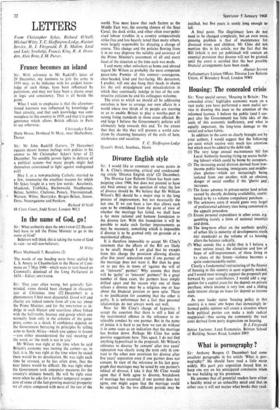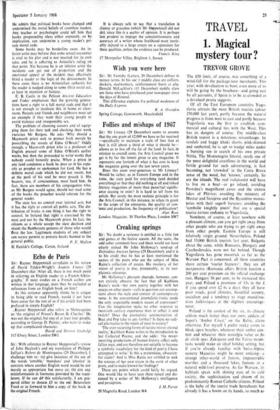What is pornography ?
Sir: Anthony Burgess (1 December) had some excellent paragraphs in his article 'What is por-. nography?' He should have read a little more widely. His parti pris exposition forced him to keep one eye on his anticipated conclusion when he was building up his premisses.
He assumes that all potential readers have either.' a healthy mind or an unhealthy mind and that-in. either case it will not matter what books they read.
He admits that political books have changed and undermined the moral. beliefs of countless readers. Any teacher or psychologist could tell him that books propounding ideas either expressly, or by implication, can undermine a young reader's pri- vate moral code.
Some books may be borderline cases. An in- feriorartist may believe that some sexual encounter is vital to his plot and is not inserted for its own sake, and he is adhering to Aristotle's ruling on that point. Yet because he is an inferior artist the incidents can get out of proportion and the emotional appeal of the incident may effectively blind a reader to the logic of the denoueMent: In these cases there is no Aristotelian catharsis for the reader is nudged along to some illicit social act, at least in intention or fantasy.
E. B. Castle in the Pelican Ancient Education and Today emphasises that the growing genera- tions have a right to a full moral code and that it is not enough to inculcate this in home or class- room. Parents. and friends and neighbours must set an example if they want their young people to avoid violence and irresponsible sex.
The problem of choosing censors and of equip- . ping them for their task and checking their work exercises Mr Burgess. He asks 'Why should a Maynooth priest seek to protect Irish morals by proscribing the novels of Edna O'Brien?' Oddly enough, a Maynooth priest .who is a professor of English praised some of Edna O'Brien's earlier works, but then she proceeded to write works that nobody could honestly praise. When a priest in any land condemns a book he does so in his capa- city as prophet or spokesman .for God. He has a
• definite moral code which he did not invent, but at the peril of his soul he must preach it. His hearers, too, if conscientious, must heed him. In • fact, there are members of his congregation who, .as Mr Burgess would agree, should not read some -of the books the preacher would tolerate for the • general reader.
The state has no control over internal acts, but .it has the right to control all public acts. The dis- =tribution of books is one thing. it has the right to control. In Ireland that right is exercised by the state and not by the Maynooth priest. In fact, the citizens as a whole accept the state decision and .resent the flamboyant gestures of those who would Sok the law. Legitimate students of any subject can secure permits to procure books banned to the



































 Previous page
Previous page